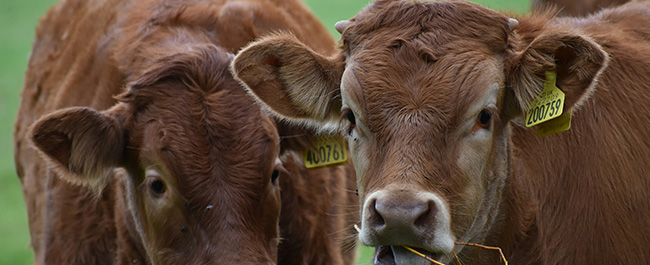Bristol-led project improves the welfare of farm animals

Welfare outcome measures and enhanced farm animal management have had a major impact on farming practices and provide greater assurance for consumers.
Research highlights
- Significant advances in farm animal welfare.
- Major impact on national policy.
- Boost for consumers through improvements to farm assurance schemes.
Farm assurance schemes are important: for the welfare of livestock and for consumers who want to know the food they buy has been produced ethically.
Work by the University of Bristol on the AssureWel project has improved these schemes by developing new, quantifiable animal observations designed to evaluate the effects of environment and management on farm animal welfare. The Bristol-led project has also:
- Helped to develop farming methods and veterinary practice.
- Informed UK government policy.
- Been incorporated into Defra guidance.
- Been adopted by the UK food retailer supply chain.
Transforming assessment methods
Welfare outcome measures are quantifiable indicators that provide a direct measure of the welfare of assessed animals. Previous practice focussed on assessing factors that influence welfare, such as environment and housing.
The University of Bristol research has transformed this practice by developing new protocols that also assess the long-term outcome of those factors on the health, physical condition and behaviour of animals.
Initial research funded by the British Pig Executive focused on optimising the validity, repeatability and feasibility of these outcome assessments.
This body of work generated specific recommendations for the implementation of welfare outcome measures into farm assurance schemes, including a defined list of five measures which need to be assessed every quarter by a veterinary surgeon.
The Bristol team subsequently created the AssureWel Project – a collaboration with the RSPCA and the Soil Association that has established bespoke welfare outcome assessments and management practices for five other livestock types: laying hens, broiler chickens, dairy cattle, beef cattle and sheep.
Impact on practice and policy
Over the last ten years, Bristol’s research and action on animal welfare has had a major impact in UK farming. The AssureWel project has successfully implemented welfare outcome assessments into all the UK’s leading farm assurance programmes - including the Red Tractor Assurance, RSPCA Assured and Soil Association Certification schemes.
So far this helped to improve the welfare of over 84 million farm animals. In cattle, for example, data analysed over a four your period showed that 45,000 fewer cows were lame, 18,000 fewer were fat, 135,000 fewer were dirty and 72,000 fewer suffered from hair loss, lesions or swellings.
The Lion code, which applies to around approximately 95% of UK egg production, requires producers to implement at least six management strategies from the FeatherWel guide – a sub stream of the AssureWel project that focusses on laying hens and meat chickens.
The work has Informed national regulatory policy. Defra codes of practice for laying hens, meat chickens, meat breeding chickens and pigs all promote welfare outcome assessments to monitor welfare. The codes also signpost users to the AssureWel and FeatherWel projects for guidance on measuring welfare outcomes.
Influence has spread internationally too. In 2018, the Bristol team was contracted to develop welfare outcome measures for the Belgian Pig Assurance Scheme (Belpork), covering 2,500 farms representing 50% of national production.
AssureWel International has been established as a group of stakeholders including representatives from farm assurance schemes in the USA, Germany, Austria, Netherlands and Serbia who have implemented welfare outcome assessment and maintain an online training and knowledge hub.
For UK consumers, extra assurance comes from the fact that major food retailers have also included welfare outcome measures within their supply chain requirements – many of whom, including Marks & Spencer, Morrisons, Sainsbury’s Tesco and Waitrose, have acknowledged the University of Bristol’s direct support in providing training to employees.
The Bristol-led project has helped to develop farming methods, informed UK government policy, been incorporated into Defra guidance, and has been adopted into the UK food retailer supply chain.
Connect with the researcher
Dr Sarah Lambton, Senior Lecturer in Livestock Welfare and Innovation, Bristol Veterinary School.
Cite the research
Lambton S, Nicol CJ, Friel M, Main DCJ, McKinstry JL, Sherwin CM, Walton J, Weeks CA. (2013). A bespoke management package can reduce levels of injurious pecking in loose-housed laying hen flocks. Vet Record, 172: 423 429.